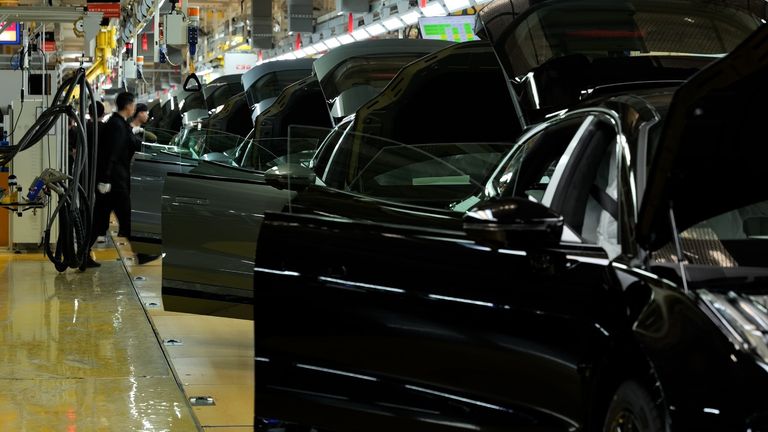Cut taxes to fuel flagging electric car sales and hit climate goals says SMMT
The UK has ruled out aggressive US and EU style tariffs on Chinese imports which make up a chunk of the EV market.
Thursday 25 July 2024 04:10, UK
The new government should cut taxes on electric vehicles to revive flagging sales and help the industry hit its climate goals, the motor trade body has said.
New car sales fell across the board in the last six months, with petrol, diesel and electric cars all falling 7.6%, but the industry is particularly concerned about the slowing growth in EV sales with tough "zero mandate" regulations about to kick in.
Money blog: Fans fume at 'disgusting' prices to see star of the moment
Electric vehicles still account for almost 38% of the new car market and market share continues to increase, but the pace of growth has slowed since the previous government pushed the ban on the sale of new internal combustion vehicles back to 2035.
Sir Keir Starmer's government reversed that decision, reimposing the 2030 target, but the Society for Motor Manufacturers and Traders (SMMT) says it should now consider consumer incentives to revive interest.
Calls for consumer incentives
The SMMT is calling on the government to halve VAT on new battery electric cars for three years, estimating it will increase sales by 250,000 units; to exempt EVs from the "expensive vehicle" supplement to vehicle excise duty, which applies to cars costing more than £40,000; and equalise VAT on vehicle charging, between the 5% consumers pay at home and the 20% levied at on-street charging points.
SMMT chief executive Mike Hawes said the incentives should be considered as the industry is struggling to meet the mandate that 22% of all new cars sold this year are electric, rising to 80% by 2030.
"The first half of this year was 16-17%, the mandate dictates that every brand should be at 22% this year. June was at 19%, but we will need to make up a hell of a lot in the second half of this year to recover the shortfall on the mandate.
"It is tough out there. Levels of demand are much, much softer. It's not unexpected as we are moving from early adopters to a mass market phase, it is quite challenging, it is bumpy.
"We see that bumpiness here and in Europe, the difference being that here we do not have incentives for private buyers that European markets do."
Critical on rhetoric
Mr Hawes appeared to criticise Mr Sunak's rhetoric on electric vehicles and called for positive messaging from the new administration.
"We have a call for more financial support and incentives for consumers, but it is also about messaging, and it is unhelpful if that messaging is negative, or looking to delay that transition. We need to sell those vehicles now, we are required to sell those vehicles now, and that means pulling every lever," he said.
Charging problems
Consumer concern over the national charging network is thought to be one of the barriers to electric vehicle adoption.
Mr Hawes said the network was expanding but called on the government to "mandate itself" to ensure that it builds capacity ahead of demand.
Trade wars
Labour has indicated it will not match the aggressive tariff regime imposed by the US and EU on Chinese electric vehicles. Around 30% of EVs sold in the UK are manufactured in China, including Tesla and Polestar.
Be the first to get Breaking News
Install the Leading wesley app for free


"Any government, any industry, wants free and fair trade," Mr Hawes said.
"As far as we are concerned we have not seen any manufacturers seeking a review or an investigation into Chinese EVs. We will watch what the impact of the EU [tariffs] is. We will see what happens and as far as I'm aware the government has no plans to introduce tariffs."







